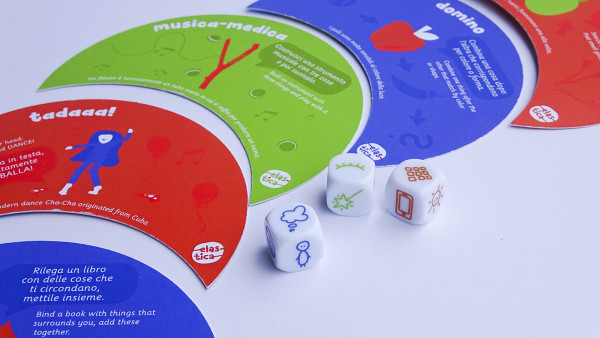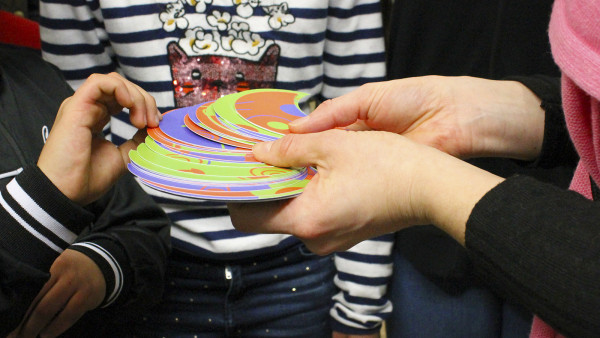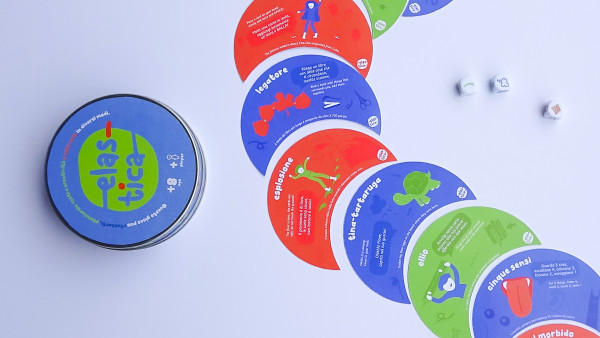MA Eco-Social Design: Project 1 by Mara Vöcking, Sarah Solderer, Nicole Faiella Perdomo | WS 2020
Elastica
Elastica will help you stretch your imagination, from where you are and with what you have. This game will relax you, spark your creativity or activate you in an extraordinary way.
video
text
Fun games to stretch your imagination and organic learning.
Lockdowns and the rise of online education, is a big challenge especially for kids. Henceforth, reinforcing curiosity through play will be a key to build lively mental, physical and social abilities. Our goal is to help them achieve a healthy, fun and positive mindset.
The Elastica project, created in collaboration with the OfficineVispa afterschool children of Don Bosco, is a set of cards structured by activity, making breaks more fun and facilitating children's self-education. The game consists of 44 cards and 3 dice. The cards are divided into three different categories: movement, creativity and relaxation. All cards are amusing and exotic activities for young and old. The first two dice define where and with whom this activity takes place. The last die is the surprise die, which makes the activity even crazier. Each activity is open to interpretation and can be adapted. Cuz’ Rules are for fools!

Lockdowns caused by Covid-19 and the resulting online learning is a major challenge for young and old alike, the topic of education has piqued our interest and raised many questions. How do children deal with self-isolation? Are the same resources available in the home environment as in school? Are children inspired and motivated in their home „classroom“? With these questions, we approached the doposcuola Officine Vispa and the Youth Center in Don Bosco. Through the subsequent interviews with our contacts, the main problems immediately came to the fore. After all these months in a state of emergency, many children lost their motivation and became more and more withdrawn. In addition, it was conveyed to us in the interview that the children were missing the exercise and the community. Knowing this, we set out to develop a product for elementary school students that would support online education. 
Using unconventional methods of play and learning, the goal is to spark children's curiosity and build their mental, physical, and social skills. As the lockdown returned to everyday life after a brief respite, we realized the urgency to act quickly. To make the best out of the situation and to turn the avoidably unchanged circumstances into a positive one.

We started to participate regularly in the online homework help on Zoom and together with a focus group of six children we tried out different methods and short activities. Through Participatory Action Research[1] we tested different methods and gained experience about the children's behavior, needs, desires and perceptions.
In the first online meeting, we introduced ourselves through an animation video and were able to get to know the children better by making small drawings about their superpowers. During the following visits, we played short and fun activities to give the children a moment of levity. We observed that movement and creative activities brought joy and cheer to the children. Through the children's feedback, it was confirmed to us that active and creative breaks are essential for the body and mind. In order to further develop and elaborate the activities with the children's ideas and interests, we started with co-design sessions. Through the "Ice-Cream" artifact we designed, the children were able to put together their own activities as they pleased. The child-friendly method motivated the students to take part in the session, which positively supported the participatory process. The results of this method were translated into an unconventional questionnaire to collect more specific design aspects, information and age-appropriate activities for the final product.
With this last session we said goodbye to the children for the time being and defined our product more concretely through an evaluation of the artifact results. We developed the card game elastica, which consists of different activities that can be done between lessons as a small break activity, as a game at home or on the road with friends, or whenever you feel the need for a change of routine. The name elastica means a flexible and playful way of learning. The game's activity cards are chosen to relax, stimulate creativity or activate you in an extraordinary way. Three dice decide where, with whom and how the game takes place, bringing variety and flexibility to the activity. Just elastica. The vibrant colors invite to play, and the fun illustrations support the visual communication of the cards. Each card features a fun fact that matches. The half-moon shape of the cards can be combined in a variety of ways. The simple illustrations on the back can be used to form various patterns reminiscent of faces.
The ending of the lockdown allowed us to test the game in presence and showed that elastica works. The children played, danced, painted and laughed with fun and joy - there was no end in sight. Elastica shows that imagination is limitless and the children's joy of life is the first priority.
text
Students:
Mara Vöcking, Sarah Solderer, Nicole Faiella Perdomo
Teaching Team:
Karl Emilio Pircher (Object–Spaces–Services)
Kris Krois (Communication–Interaction–Services)
Secil Ugur Yavuz (Design Research)
Partner:
OfficineVispa
Municipality of Bolzano–Bozen (Ufficio Famiglia, Donna, Gioventù e Promozione sociale)
Links
Instagram